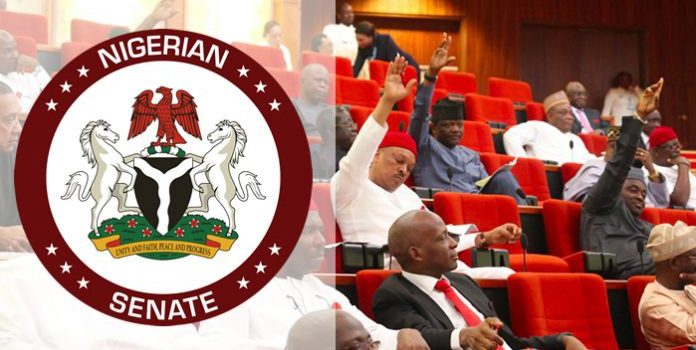
Recommendations
For
The Senate, National Assembly, Federal Republic of Nigeria Committee on the Review of the 1999 Constitution’s Zonal Public Hearing on “the Proposed Alteration to the Provisions of the Constitution of the Federal Republic of Nigeria, 1999” Public Hearing fixed for Wednesday 26th and Thursday 27th May, 2021
24th May 2021
Pursuant to the invitation of the Senate Committee on the Review of the 1999 Constitution of 17th May, 2021, in the national dailies to members of the “General Public, Government Functionaries, Civil Society/Interest Groups, Nigerians in Diaspora, Professional Bodies, and other interested persons”, we the members of the Youth Party hereby submit the following proposals for your consideration as part of the review and amendment of the 1999 Constitution on the listed issues :
- Gender Equity/Increased Participation of Women and Vulnerable groups in Governance.
The importance of women as part of the Nigerian society cannot be overemphasized. However, their participation in governance has been limited due to cultural and institutional factors that do not sufficiently recognize the need for their involvement in public decision making. Another vulnerable group that needs attention are persons with disability, they are often ignored from the discourse of inclusion in the political system or any other decision-making sphere. The present statistics on women in politics are very worrisome. For instance, the percentage of women in the Nigerian Senate has been below 15% since the Country’s transition to democracy in 1999. Also, out of 360 House of Representatives members, we only have 13 women in the House. This abysmal statistic is not even close to the 30% benchmark set by the United Nations, the Beijing platform for action or even the Maputo protocol.
Recommendation:
We recommend that certain number or percentage of women and people with disability should be stated in the Constitution to guide the political parties in the fielding of candidates and also the Governors/President in the choice of their cabinet members hence;
- We recommend the amendment of the following sections Section 48, 49, 91, 71, 72 to reflect the National Gender Policy by ensuring that 35% of the composition of the national and state parliaments shall be reserved for women, to promote gender diversity
- We recommend that the appointment of the Federal Executive under section Section 147(3) be amended to include that 35% of such appointments shall be female.
- We recommend the amendment of section 223(1) on the composition of Political Parties leadership, by including that the election of the officers or members of the executive committee shall comprise of at least 35% women’s representation.
- We recommend that the Fundamental Objectives and Directive Principles of State Policy set out in Chapter II of the Constitution; be made justiciable by deleting section 6(6)(c) of the constitution to give effect to socio economic rights that protect women and vulnerable groups.
- We also recommend that the legal age of marriage be established at 18 years.
- Local Government Administration and Autonomy
Nigeria operates a federal system of Government, a system that envisions a sufficient level of autonomy for every level of government. Amongst this levels of government, the local government, which is the closest to the people and it ought to be an agent of grassroots development and participatory democracy. The Constitution fails to make clear provisions regarding the form of organization for local government, leaving it at the discretion of the state governments. The local government system is so greatly undermined that it cannot effectively play its role as agent of development at the grassroots, in spite of a significant monthly allocations from the federation account.
Recommendation:
2.1. We therefore recommend the deletion of Sections 3(6), 7(6) (a), 162(5), 8(5) and (6) and 153(1) (f) of the Constitution, which gives opportunity to the federal government to interfere with the States’ power over the creation and management of the local government system. Expunging these constitutional provisions will place the local government system in their proper position under a truly federal structure.
2.2. State Governments should be given a constitutional guaranteed unfettered power to create as many local governments as they deem fit.
3.0 Allocation of Funds
Another provision in our political system that undermines local government autonomy involves finance. This issue of finance has grossly undermined the autonomy of the Local government as some local governments cannot access funding for their administration without such funding being vetoed by the State Government. This un-federal feature is provided for under section 7(6) (a) and 162(5).
Recommendation:
3.1 The Constitution should expressly void and abolish Section 162(6) which provides for the establishment of joint accounts by State-Local Government.
3.2 The Constitution should ensure direct federal funding to local government councils without state governments interference.
3.3 Section 3 (6) should be abolished and deleted from the Constitution to allow for more creation of Local Government Areas in the Country
4.0 Local Government Elections
Another area of constitutional concern is the weighty federal control or interference with local government affairs with regard to elections. By virtue of Section 153(1) (f) & the Third Schedule, Paragraph 15 (e) of the Constitution, the Independent National Electoral Commission (INEC), an agency of the Federal Government has powers to arrange and conduct the registration of persons qualified to vote and prepare, maintain, and revise the register of voters “for the purpose of any election under this Constitution”. However, we find this problematic, we therefore recommend that;
Recommendation:
4.1 Amendment of the Third Schedule, Paragraph 15 (e) of the 1999 Constitution (to provide for the performance of that function by the State Independent Electoral Commission when it comes to Local Government Elections). These undermined the powers and responsibilities of the state government on local government under section 7(1) of the Constitution including conducting elections.
4.2 We recommend that the State Independent Electoral Commission (SIEC) must be allowed to carry out every function related to the conduct of election including the revisions of voters register. Hence, SIEC should be vested with the powers to keep voters registered.
5.0 Tenure of Elected Local Government Officials
Another pertinent issue for reconsideration is the constitutional omission of the tenure of the Local Government Council. While the tenure for the President and Governors are expressly provided for, the tenure of the Local Government Council Office Holders is surprisingly omitted.
Recommendation:
5.1We propose that Section 7 of the Constitution should be altered to include a four-year tenure for the all-Local government council office holders.
6.0 Public Revenue, Fiscal Federalism, and Revenue Allocation.
There is no gainsaying that our public service and infrastructure are not working. We need to raise government revenue capacity in order to address these urgent critical spending needs. Nigeria has a huge revenue problem as we are not generating enough but we are spending more. Recurrent expenditure is high, and our debt is piling up. Most importantly, we are not practicing fiscal federalism: with States collecting their revenue and remitting a percentage of it to the FGN. Currently, the FGN collects most of the taxes and then allocates revenue to the other tiers of government. This has led to many distortion in the structure. For example, the states have no incentive to raise their revenue instead they mostly wait for the end of the month to head to Abuja for hand out.
Recommendation:
6.1 Section 162 (2) of the Constitution as well as the legislative list should be amended to allow the states to collect taxes over mineral resources within their territory and remit 25% of such taxes to the Federal Government
6.2 The Constitution should be amended to clear the ambiguity over the collection of consumption tax (VAT) by the Federal Government for the benefit of the States. The States should administer/collect VAT within their territories
7.0 State Police
One of the main duties of government is the security of lives and properties. The Nigeria Police Force is charged with internal security and law enforcement in Nigeria. However, the force is inept with varying issues that need urgent intervention. To ensure the efficiency of the police force, there has been a clamor for States to be allowed to constitute and manage their own State Police Departments.
However, this must be done following a practical roll out plan in order to forestall an exacerbation and multiplication of the current issues with federal law enforcement, at the State level.
Recommendation:
7.1. We recommend that a pilot State Police Program be run in economically viable states for a period of 4 years. Furthermore, any State that is desirous of establishing a State Police Department must demonstrate the ability to fund the Department.
7.2. Also, a State Police Service Commission with clear oversight powers and ability to discipline erring officers, must be established contemporaneously with any State Police Department.
7.3. In the event of gross mismanagement or abuse of powers by a State Police Department, the Attorney General of the Federations shall have the powers to approach the Supreme Court for an order directing his or her office to take over the administration of such State Police Department until the State demonstrates the ability to remedy and prevent the recurrence of the abuse or mismanagement.
8.0 Judicial Reform.
The judiciary is the last hope of the common man and there is no gain saying that the Nigerian judiciary is in urgent need for reform particularly in the composition of the members of the National Judicial Council (NJC), which currently consist largely of serving and retired judges with little room for neutrality over the appointment and discipline of judges.
The National Judicial Council (NJC) is one of the Federal Executive Bodies created by the 1999 Constitution of the Federal Republic of Nigeria. Amongst other functions, it is responsible for the Appointment, Promotion and Discipline of Judicial Officers.
The current composition of the Council as regards discipline of judges and justices (which includes the Chief Justice of the Federation) creates conflict of interest particularly as it relates to the Chief Justice of Nigeria (CJN) who is the Chairman of the NJC and the next most senior justice of the Supreme Court, the Deputy Chairman . It is on record that a situation arose in recent past that borders on discipline of the CJN; the concerned CJN refused to convene meeting of the NJC. It is also interesting that that the Deputy Chairman will be the sole beneficiary if the CJN is found culpable.
It is a common saying and a living fact that justice delayed is no justice. The centralized appellate court system in Nigeria has given birth to more injustice than justice due to delays. It is a known fact that litigants threaten each other with appeals. Our appellate courts are overburdened due to the centralized system.
Recommendations:
- No serving justice or judge should be a member of the Disciplinary Committee of NJC.
- Court Structure: It is our position that each state should have an independent appellate system to deal with all residual matters and matters which are exclusively for High Courts of States. Thus, each state should have its own court of appeal and supreme court on matters it has exclusive powers to legislate on.
- Only, constitutional matters and matters on the exclusive list should go through the federal appellate court system, that is the Federal Court of Appeal and Supreme Court of Nigeria.
- Each state should have a body modeled after the reconstituted NJC for appointment, promotion and discipline of judges.
9.0 Electoral Reform
Nigeria is a Country riddled with lots of electoral inconsistencies ranging from electoral violence to rigged elections etc. Therefore, several amendments need to be made to improve on the electoral process in Nigeria to allow for credible, free, and fair elections to aid Nigeria’s democratization process.
Recommendation:
9.1 The Third Schedule, Part 1, Section 14(1)(2) of the Constitution of the Federal Republic of Nigeria 1999 on the mode of appointment of INEC Commissioners and Resident Commissioners needs to be amendment for neutrality and the blatant partisanship currently displayed by officials of INEC
9.2 In partial support of the Uwais’ Committee Report on Electoral Reforms, we recommend that:
- The NJC should be in charge of the advertising the positions and screening applicants for vacancies into the positions of INEC commissioners and Chairman within 20 days from the date of the expiration of their term of office.
- The NJC should then recommend three applicants to the President within 20 (Twenty)days from the date of screening.
- The President should then forward the name of one out of the three nominees to the Senate for confirmation within 30 (Thirty) days upon receipt of the list.
- Where the President rejects the names on the list sent to him by NJC, the NJC shall conduct another screening in line with (a-c) above.
- where the President fails to nominate one out of the second list of nominees to the Senate within 30 (Thirty) days, the NJC shall then nominate one person out of the three and forward to the Senate for confirmation.
9.3 Section 225A of the Constitution for de-registration of political parties should be amended to ONLY apply to political parties that have had the opportunity to participate in all the elections within a 4 (Four) year term. For example, it would be unfair for the aforesaid provisions of the Constitution to apply to political parties registered in 2018, who have not had the same opportunity as the other existing parties to grow. And, most importantly, have not had the opportunity to participate in all the recent elections save for the 2019 General Elections in order to meet the requirement for continued registration.
9.4 INEC should approach the Court for deregistration of Parties and state the grounds for deregistration with sufficient clarity and precision. This power must only be exercised upon obtaining a Court order granting leave to exercise same. This is similar to the position for disqualification of candidates, winding up of banks and other similar institutions. Deregistration is tantamount to taking the life of a Party and the decision should be left to the Court. If the disqualification of a candidate from an election for ineligibility regardless of the evidence cannot be done by INEC but by the Court, it is ridiculous that the political Party sponsoring him or her can be deregistered administratively. This is unacceptable and bound to lead to injustice not to mention breach of fundamental human rights freedom of association and breach of fair hearing contrary to Section 36 of the 1999 Constitution. The power to deregister should be exercised through the Federal High Court.
9.5 Proportional representation be adopted for legislative elections, but the current number of seats in the various houses should be maintained. The constituencies should be redrawn and enlarged so that 2/3rd (two-third) of the current number of seats for each state in the National Assembly for instance, will be spread across the whole State and be filled by plurality voting. The remaining 1/3rd (one-third) of the seats for each State will then be filled using proportional representation. The current system encourages the winner takes all mentality of the political and create a lack of checks and balances in government as the votes of the losing parties not acknowledged
9.6 We agree with the Uwais’ Committee recommendation that election petitions should be concluded before swearing in. However, we recommend that the elections should be held six months before the dates of the swearing-in to ensure the completion of election petitions prior to the date of swearing in. (unresolved)
9.7 We recommend that the SIECs should be retained. The mode of appointment of the Commissioners should be the same as that of INEC. That is, the screening of applicants and recommendation of three candidates to the Governor should be done by the State Judicial Service Commission (SJSC) and the Governor will recommend one out of the three to the House of Assembly for confirmation.
9.8 The current manual voting process should be replaced gradually with electronic voting. In adopting electronic voting, the particular type to be deployed during any election should be approved by the political parties.
10.0 Residency & Indigeneship
The issue of residency and indigene-ship has been a source of perennial violent unrest in many Nigerian cities notably Jos, Kaduna, Ife, and many others. We believe this is because of the ambiguity between the rights of an indigene, resident, and citizen, which creates undue tension.
Recommendations:
10.1 It is our position that a citizen is not a resident of the State unless he has been resident in the State habitually for 4 (Four) years. The Residency should then confer residency rights to enjoy all social amenities within the State.
10.2Most importantly, there should be laws enacted to safeguard the interest of indigenes to reduce the tension between them and residents. The first should be the protection of indigenes through the reservation of a land base, which may not be open to purchase by residents or acquisition by the government when it relinquished its other land areas to the public. This is necessary to safeguard the cultural and traditional way of life of the indigenous members of the state.
10.3 There is a need for national recognition of indigenes within a particular locality. With the constant migration of Nigerians from various parts of Nigeria into different states, there is a tendency for their indigenous way of life or even their identity as original locals of an area to be given up freely as part of the migration from different parts of Nigeria. Therefore, there is a need to safeguard the indigenous culture, including passing on traditional religious beliefs, languages, and social practices without fear of discrimination. A way of promoting this recognition may be through affirmative action where these indigenes who are minority group members are given preference or special consideration in the allocation of resources.
10.4 Additionally, in the appointment of cabinet members into the State Executive Councils, consideration must be given to ensure that at least 80% of the cabinet comprises indigenes of the particular state. Specific positions such as the ministry of Local Government and Chieftaincy Affairs and the ministry of Justice, ministry of Education and ministry of Finance should be reserved for indigenes of the state to superintend.
11.0 Immunity- Removal of Immunity in a Prima Facie Case
Political offices are public trusts and persons elected to these offices become public trustees. It is trite that a trustee must be a person of character and integrity to be able to manage whatever the settlor is trusting on to him for the benefit of the beneficiaries. It is therefore our belief that for the advancement of common good and to ensure that only persons of integrity and unquestionable character are elected to public offices, there is need to amend the Constitution to disqualify persons who have pending criminal cases against them from vying for public offices.
Recommendation:
11.1 Section 66, 107, 131 and 177 of the Constitution should be amended to allow INEC to disqualify any candidate who has any pending criminal charge from contesting in any election until he is cleared of all charges – (unresolved).
11.2 Pre-election matters relating to eligibility of candidates should be given the same expeditious hearing and status as election petitions. It should be resolved at the high court and at the Court of Appeal being the final Court before the Election.
11.3 The office of the Attorney General should be separated from that of the Minister of Justice so that the President and Governors will not employ this provision to shut out their political opponents by filing trumped up charges against them through the Attorney General so as to disqualify the person.
11.4 The immunity clause should be left as is to protect the holders of public offices from distraction during their tenure unless they are impeached by the legislative houses on the basis of the establishment of a probable(prima facie) criminal case against the public officers.
15.0 States and Local Government Creation:
The issue of states and local government creation has led to agitations from states and ethnic groups, which makes the need for a widely acceptable criteria imperative
Recommendations:
15.1. It is our position that the creation of additional states must be based on the economic viability of the aspiring state to meet the financial needs of its people without recourse to the Federal Government or federal allocation. This should be followed by a referendum in the State.
15.2 We posit that the process strictly adhered to the requirement for constitutional amendment. That is, 2/3 of the votes by the National Assembly and the State House of Assemblies in 2/3 of the States.
In summary, a new state must be economically viable, financially sustainable, secure the consent of its residents/indigenes as well as the existing States that it would be carved from.

Mr. Tomiwa Aladekomo
Acting National Chair
0



